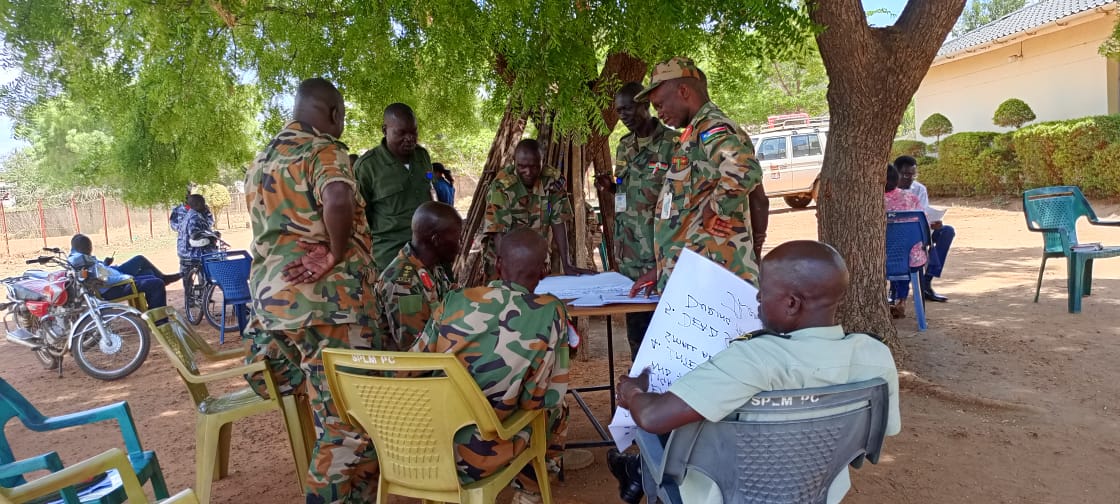Governance, Peaceful Coexistence, and Disarmament of the mind
Japan and UNDP support the training of 150 Women and Men in Eastern Equatoria State
May 3, 2024

Women's group and returnees in Torit County deliberating solutions for disarming the mind at Boma and Payam level
Eastern Equatoria State is one of the states that hosts returnees and internally displaced persons (IDPs). As of March 2024, according to Office for the Coordination of Humanitarian Affairs (OCHA), Eastern Equatoria State holds 96,000 IDPs and borders Uganda which hosts 932,000 South Sudanese refugees, some of whom are returning to South Sudan through the state. However, escalating tensions between communities from neighboring villages have led to more people being displaced within the state, over 10,000 cattle being raided, with many homes and community infrastructures destroyed in the process. This is affecting the return of IDPs and refugees.
To respond to this and to help facilitate the return and integration of displaced persons in Eastern Equatoria, and also ensure a sustainable return, there is need to engage and train men and women in Eastern Equatoria on their roles and responsibilities in promoting peaceful co-existence, good governance and the disarming of the minds of civilians on negative impacts of carrying weapons in the communities.
From 14th - 15th March 2023, UNDP in collaboration with the South Sudan Bureau for Community, Security and Small Arms Control with support from the Government of Japan brought together 150 (40 female) men and women from various Payams in Torit County, Eastern Equatoria State – Hiyala, Ifwotu, Imurok, Kudo/Lowoi, Bur, Nyong, Iyire, Himodonge, and trained them on the importance of peaceful co-existence, the role of men and women in promoting peaceful co-existence and the culture of Ubuntu, and on the role of men and women in engaging in governance.
The 150 targeted men and women comprised of youth, South Sudan People’s Defense Force (SSPDF), South Sudan National Police Service (SSNPS), women’s group, returnees, chiefs, civil society organizations and women associated with armed forces and groups on their roles in peaceful co-existence, governance, and disarmament of the mind. The objective of the training was to promote education on governance, peaceful co-existence, and non-proliferation of small arms to facilitate the return and integration of communities affected by inter-communal conflict, creating conducive environment for the return of IDPs and refugees.
The participants were trained on the South Sudan Voluntary Civilian Disarmament Strategy, chapter 4 and 10 of the South Sudan Firearms Act, the dangers of the proliferation of weapons and ammunitions, and on some practical sessions on the reasons and solutions for the proliferation and misuse of firearms. The training also facilitated the establishment of community volunteer taskforce to advocate against the misuse of firearms in Torit County.

SSPDF deliberating solutions for disarming the mind at Payam and Boma level in Torit County
The participants therefore called for nation-wide disarmament and speedy deployment of unified or security forces to facilitate voluntary civilian disarmament. A key solution to curtailing arms proliferation as agreed by all participants is to work with the military in promoting voluntary civilian disarmament.
The composition of the training increased positive behavioral and attitudinal change towards the use of firearms, which will foster increased safety and influence return of IDPs and refugees. It also improved the understanding of men and women on peaceful co-existence, governance, and inter-dependencies, which will influence positive environmental change to ignite the resettlement of IDPs and refuges. Three Payams in Torit County started the formation of a voluntary community taskforce to advocate against the misuse of firearms. The other five Payams needed to engage their communities before a decision on the same.
This activity promoted Goal 16 of the SDGs which seek to promote peaceful and inclusive societies for sustainable development, provide access to justice for all and build effective, accountable and inclusive institutions at all levels. The activity is also compliment South Sudan’s United Nations Sustainable Development Cooperation Framework (UNSDCF) 2023-2025 Outcome 1: Women and men in South Sudan, particularly youth and vulnerable groups, benefit from and participate in more transparent, accountable, and inclusive governance that protects and promotes human rights, enables the consolidation of peace, establishes the rule of law, and ensures access to justice for all.

 Locations
Locations


